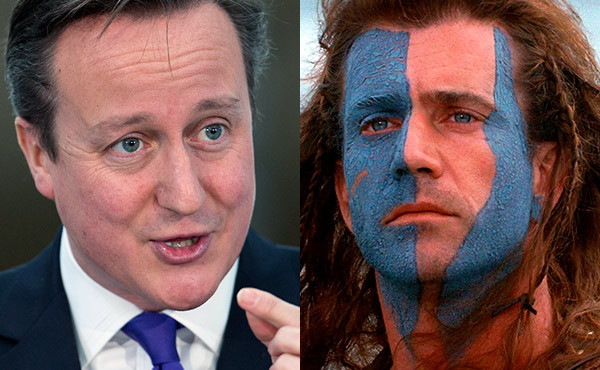David Cameron is No Braveheart: Leading from Behind on Scottish Independence

It seems a pretty odd affair when the British prime minister delivers his most significant speech on Scottish independence from the Olympic Park in England and then relies on a Labour politician, Tessa Jowell, to back him up on morning news programmes in London.
But the entire thrust of David Cameron's anti-independence speech was curious, urging the English, Welsh and Northern Irish – who don't have a vote - to plead with their fellow Scots not to break up the Union.
Wouldn't it be much simpler if the prime minister just travelled north of the border to plead directly himself with Scottish voters to say "no" on September 18?
Well, no, it wouldn't, not if he wants the Scots to reject independence. And that is the problem. Cameron is a gold-plated liability in this campaign and he knows it.
As he recently told the Commons when it was suggested his posh, Tory image was a handicap: "My appeal doesn't stretch to every single part." He may be planning to take his cabinet to Scotland for a meeting behind closed doors, as he announced, but he will not be meeting first minister Alex Salmond in debate or pushing himself too much into the faces of the voters.
Some people have even advised me to stay out of this issue, and not to get too sentimental about the UK. But frankly, I care far too much to stay out of it. This is personal.
The polls consistently suggest Scotland will vote to remain part of the UK but there is anecdotal evidence from the country that this traditional situation is more flexible than the surveys are showing.
There has always been the expectation that the gap between the "yes" and "no" camps would narrow as referendum day approached and there are many in the pro-independence campaign who believe it may not take too much to push them over the 50% winning line.
And they hope and believe that David Cameron would be just that extra shove needed to do the job for them, particularly if he delivered a similar speech in, say, Glasgow or Aberdeen, or even agreed to go head-to-head with Salmond in a TV debate.
This is for the simple reason that anti-Tory sentiments in Scotland were driven to near hatred when Tory prime minister Margaret Thatcher treated Scotland as a petri dish for her hated poll tax in 1989. The party has been virtually eliminated in Scotland since then.
The prime minister did his best to dismiss that factor, saying: "Pounds and pence and institutional questions, that's not what it's really about, for me. And this, really, is why I'm standing here today.
"There is a moral, economic, geopolitical, diplomatic and yes – let's say it proudly – an emotional case for keeping the United Kingdom together.
"Some people have even advised me to stay out of this issue, and not to get too sentimental about the UK. But frankly, I care far too much to stay out of it. This is personal."
And what he delivered was, at its core, a personal and emotional plea not to undermine the UK's historic standing and position in the world.
He has recognised that emotion and patriotism will play a large part in the vote in Scotland and by trying to invoke the spirit of the 2012 Olympics and Team GB he was attempting to ensure it was patriotism for the UK rather than Scotland that will win the day in September.
He even attempted to draw on his own Scottish heritage, saying: "The name Cameron might mean 'crooked nose' but the clan motto is "Let us unite" – and that's exactly what we in these islands have done."
But deputy first minister Nicola Sturgeon summed up the view of the nationalists, and even many in the anti-independence "Better Together" campaign, declaring: "David Cameron, as the Tory Prime Minister, is the very embodiment of the democratic case for a 'yes' vote for an independent Scotland — and he knows it."
© Copyright IBTimes 2025. All rights reserved.






















